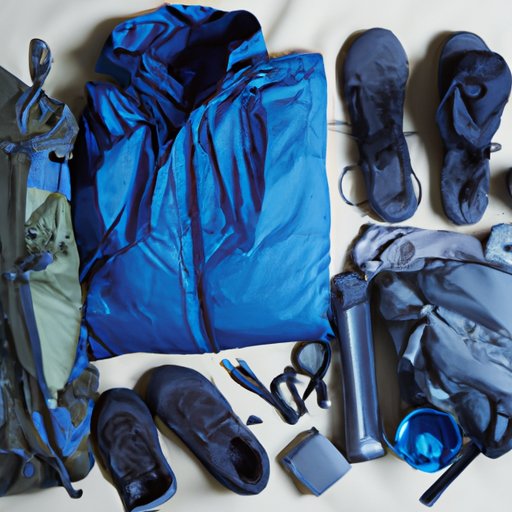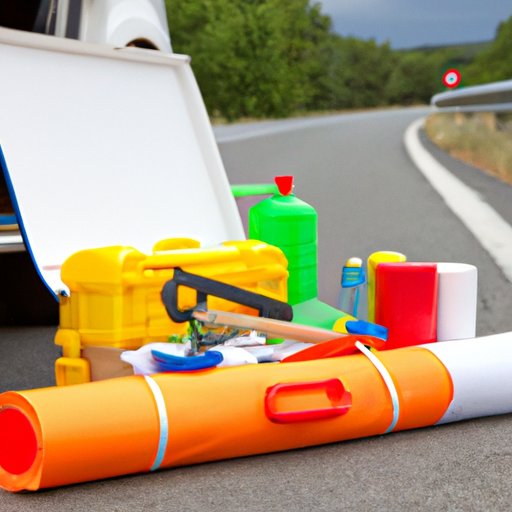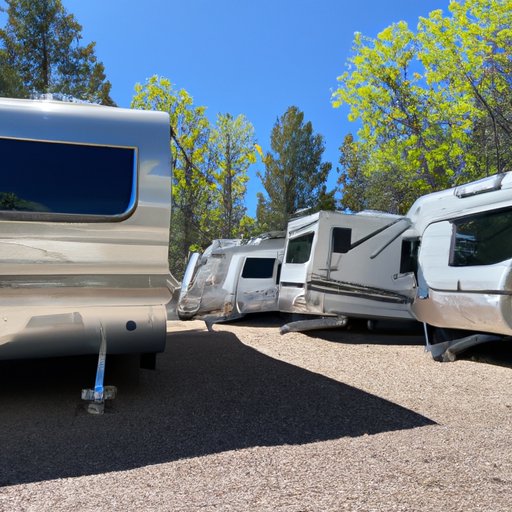Introduction
Exploring the great outdoors in an RV is the perfect way to relax and enjoy a much-needed vacation. But with so many details to consider, it can be overwhelming to plan a successful RV trip. From stocking up on supplies to mapping out your route and taking safety precautions, there are plenty of things to keep in mind when planning your journey. This article explores how to plan an RV trip from start to finish, offering tips and advice on everything from reserving campgrounds to staying safe on the road.

Gather Essential Supplies for Your Trip
Before you hit the road, it’s important to make sure you have all the necessary items you need for your RV trip. According to a survey by the Recreational Vehicle Industry Association (RVIA), the most popular supplies that RVers bring on their trips include kitchen essentials, bedding, and outdoor gear such as chairs, grills, and tents. Other must-have items include toilet paper, cleaning supplies, first aid kits, and spare parts for your RV.
To help stay organized and save space, create a checklist of the items you plan to bring along. Utilize storage compartments and drawers to maximize your RV’s interior space. And if you’re short on room, consider investing in stackable containers or collapsible furniture to make the most of every inch of your RV.
Research Potential Campgrounds and RV Parks
Once you’ve gathered all the necessary supplies, it’s time to start researching potential campgrounds and RV parks. The National Park Service offers a comprehensive list of campground locations across the United States, including sites near state and national parks, forests, and monuments. You can also find information about campgrounds from websites like ReserveAmerica.com, which allows you to search for RV parks based on location, amenities, and activities.
When choosing a campground, be sure to read reviews and check for any restrictions or limitations that may apply. Some campgrounds may require reservations, and others may not allow RVs over a certain size. Additionally, some campgrounds may offer access to amenities such as hiking trails, swimming pools, and playgrounds, while others may offer full hookups with electricity, water, and sewer services.
Map Out a Route and Plan for Sightseeing Opportunities
Now it’s time to map out your route and decide where you want to go. Consider factors such as the length of your trip, the type of terrain you’ll encounter, and the attractions you want to visit along the way. Make sure to factor in rest stops and overnight stays at campgrounds. It’s also important to plan for sightseeing opportunities, whether it’s exploring local attractions or taking scenic drives through the countryside.
The Travel Industry Association of America (TIAA) recommends using online resources such as Google Maps and TripAdvisor to plan your route. These tools can help you identify interesting places to visit and provide detailed driving directions. Additionally, the TIAA suggests downloading a navigation app to your phone or tablet to get real-time traffic updates and find alternate routes in case of unexpected delays.

Make Reservations Ahead of Time
Once you’ve mapped out your route, it’s important to make reservations ahead of time. This ensures you have a secure spot at each campground you plan to visit and helps you avoid surprises along the way. Most campgrounds offer online booking, allowing you to reserve a site without leaving home. It’s also a good idea to book early, as campgrounds tend to fill up quickly during peak travel times.
“Making reservations ahead of time gives you peace of mind and allows you to focus on enjoying the journey,” says Matt K., a veteran RV traveler. “It also gives you the opportunity to take advantage of discounts and special offers.”
Consider Health and Safety Precautions
When planning an RV trip, it’s important to consider health and safety precautions. Before you leave, make sure you have enough food and water to last the duration of your trip. Be sure to pack non-perishable items such as canned goods, dried fruit, and granola bars. Additionally, it’s a good idea to bring along a few basic medical supplies in case of minor illnesses or injuries.
In terms of safety, the American Automobile Association (AAA) recommends familiarizing yourself with the rules and regulations of each campground you plan to visit. This includes observing designated speed limits, following quiet hours, and being mindful of fire risks. Additionally, AAA suggests bringing along fire extinguishers and smoke detectors to help prevent fires, as well as flashlights and extra batteries in case of power outages.

Prepare for Emergencies on the Road
No matter how carefully you plan your trip, unexpected issues can arise. That’s why it’s important to prepare for emergencies on the road. The Federal Emergency Management Agency (FEMA) recommends packing an emergency kit with essential items such as a first aid kit, a flashlight, a radio, non-perishable food, and bottled water. Additionally, FEMA suggests having a backup plan in case of severe weather or other unforeseen circumstances.
“You never know what might happen while you’re on the road,” says Rachel H., an experienced RV traveler. “It’s always a good idea to be prepared for anything. Having an emergency kit and a backup plan can help you stay safe and get back on track if something goes wrong.”

Have Fun and Enjoy the Journey!
Above all else, remember to relax and have fun! An RV trip is an exciting adventure, and the best way to make the most of it is to stay positive and enjoy the journey. Bring along books, music, games, and other activities to help pass the time. If you’re traveling with kids, make sure to plan for educational opportunities and fun activities along the way.
“The key to a successful RV trip is to keep an open mind and embrace the unknown,” says David P., a long-time RV enthusiast. “The best part of traveling in an RV is that you never know what experiences await you around the next bend. So don’t be afraid to try something new and explore all the amazing places this country has to offer.”
Conclusion
Planning an RV trip is a fun and rewarding experience, but it requires careful preparation. From gathering essential supplies to researching campgrounds and making reservations, there are plenty of details to keep in mind. Additionally, it’s important to consider health and safety precautions, as well as prepare for unexpected issues on the road. With the right planning and preparation, you can make the most of your RV journey and enjoy a safe and memorable trip.
(Note: Is this article not meeting your expectations? Do you have knowledge or insights to share? Unlock new opportunities and expand your reach by joining our authors team. Click Registration to join us and share your expertise with our readers.)
